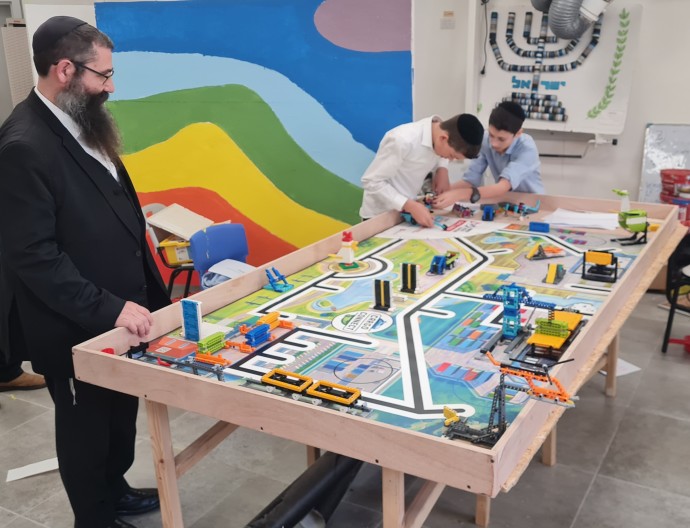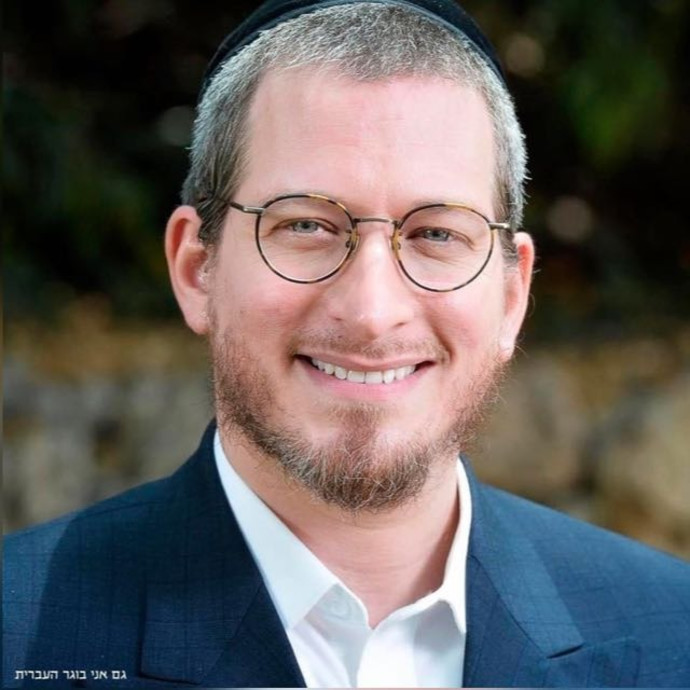‘I made aliyah at the age of 20,” says Rabbi Menachem Bombach, adding with a smile, “from Mea She’arim.”
Growing up in the ultra-Orthodox Jerusalem neighborhood, Bombach did not learn Hebrew or any secular subjects, and his decision to study general knowledge was, for him, an entry into a new world.
From an early age, Bombach was interested in working in education, but his lack of secular knowledge was a major hindrance.“The turning point for me,” he recalls, “was when a 13-year-old oleh [immigrant] from the former Soviet Union asked me if I could help him with his English homework. I couldn’t help him, and he assumed I had difficulty because English is a difficult language. He then asked me if I could help him with his math homework, but there, too, I was unable to help.”
Bombach realized that if he wanted to be a part of the world around him, he would need academic training. He earned a BA degree in education from Moreshet Yaakov College and an MA degree in public policy from the Hebrew University.

At age 45, he has realized his dream of working in education and heads the Netzach Educational Network that he founded in 2017, combining religious and secular studies, educating haredi students to be prepared to live and work in Israeli society. Netzach currently counts 12 schools in its network, which includes elementary, high school and post-high school programs for boys and girls in Jerusalem, Beit Shemesh and Betar.
Bombach, who also serves as a senior project manager at the Mandel Leadership Institute, explains that the purpose of Netzach is “to raise a generation of God-fearing people who love Torah, understand its importance, and who will excel in both religious and secular studies.”Netzach provides its students with a high-quality haredi education while preparing them to receive their matriculation certification, thereby enabling them to pursue higher education and become gainfully employed."
Bombach adds that the network imparts the skills necessary to thrive and gives students the tools needed to succeed in the 21st century, teaching critical thinking, creativity, collaboration and communication. The network includes 1,500 students in its schools and another 18,000 in its Eshkolot virtual school program, which teaches general studies in a haredi environment.
The haredi community in Israel today numbers 1.2 million people, and by 2028, 40% of first grade Jewish students in Israel will be enrolled in haredi schools. Preserving haredi identity within the State of Israel is important both for the haredi community and for the country as a whole, says Bombach.
“The haredi identity has great value and contributes to Israeli society, as long as it can be part of Israel. If it is not part of Israel, we cannot survive.”

The rapidly growing numbers of the haredi community, he explains, require that its members participate in Israeli society and join the workforce. “We need to ensure that they do not become a huge economic burden on the State of Israel and that parents who want their children to become literate adults have access to a Netzach school.”
Bombach notes that many people in the haredi world are not participants in the labor market, and many of those who are not working are also not spending their days studying Torah. “We need to ask ourselves – what’s going to be?”
Bombach explains that 10% of the haredi community in Israel considers itself “modern haredi,” and an additional 30% describes itself as “haredi with a modern outlook.” The combined 40% between those two groups is Netzach’s target market.
“By reaching them, we can attain a critical mass and reroute the path toward a sustainable financial future for haredi families and the State of Israel,” he says.Though the Netzach Network has been in existence for just five years, it has already achieved impressive results.
Within the ultra-Orthodox environment and framework of the school, fully 95% of Netzach’s high school students graduate with a full matriculation diploma, which compares favorably with Israel’s national average of 75%. Netzach’s post-high school colleges effectively prepare haredi men and women to enter university and train for professional careers.
One example of how quickly Netzach students achieve success is evidenced by the Talmud Torah Netzach Yisrael, which was established in 2018 in Beit Shemesh to provide an educational solution for the children of olim.
Nine boys from the Talmud Torah were among 84 teams who qualified from among 400 schools to compete in the Israel National Finals of the 2022 FIRST Lego League Robotics Challenge. In the first round, the Talmud Torah students received a second place award for robot design and fourth place honors for robot Performance. In the final competition, they received a special prize in the “Groundbreakers” category. The students, ages 12 and 13, are members of the school’s after-school robotics club. Netzach was the first haredi school in Israel to compete in this international competition.
Says Bombach, “I believe that our educational system can be a beacon for Israeli society. We are already seeing great accomplishments at a very high level.” All Netzach schools provide a complete Torah curriculum like other haredi institutions. But beyond Jewish studies,
Netzach schools help students in their social development, organize field trips outside the school and provide enrichment workshops in art, music, carpentry, robotics and personal development. They also encourage students to volunteer and become involved within their own communities.
Bombach recognizes that there is some opposition to the Netzach system within the haredi community.
“Any change faces some opposition,” he says. He adds that most of the opposition that has been expressed is from extreme elements within the haredi world. Bombach acknowledges that there are those who have genuine concerns and fears about the Netzach school system.
“I respect people who are concerned,” he says. “Many times, that comes from a good place.”Nevertheless, he continues, not taking any action in a situation where tens of thousands of children are growing up with little to no secular education is unsustainable. “I tell people that not to do anything is worse. We all take chances in life. Marriage also involves taking a chance. Should people not get married because they are taking a risk?” he asks rhetorically.
Bombach is delighted that other haredi school systems are also emulating Netzach’s innovations in secular studies. In 2022, the Belzer Rebbe announced that the Belz Hassidic group would begin teaching math, science, Hebrew and English in its elementary schools and heders, under the supervision of the Education Ministry, benefiting some 7,000 children.
“We attribute these changes to our activities in this area,” says Bombach. “We created a type of ‘shield’ for these subjects. We are encouraging other school systems to open these kinds of schools.” What are Bombach’s plans for the Netzach school network?
“Within two years,” he says, “we fully expect to be serving between 1,800-2,300 students.” Any plan to add more students requires the development of additional physical space, and many of the schools are planning to expand with new buildings to accommodate the planned increase in students.
As our conversation comes to a close, Bombach smiles and says that he is not trying to damage the haredi way of life but, rather, to infuse it with a greater awareness of the outside world, which will be beneficial for the entire Jewish people.
“I am not an agent for change,” he says. “I am an agent trying to preserve the community.”
This article was written in cooperation with the Netzach Educational Network.
